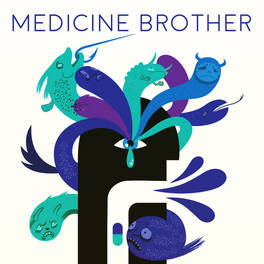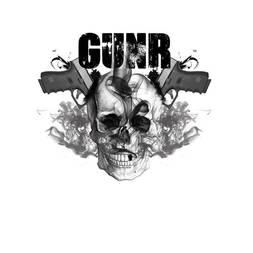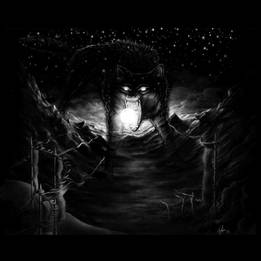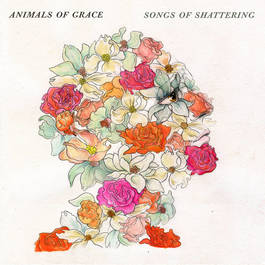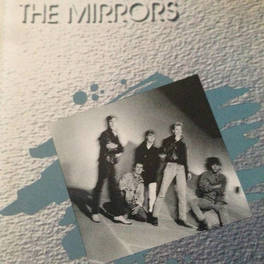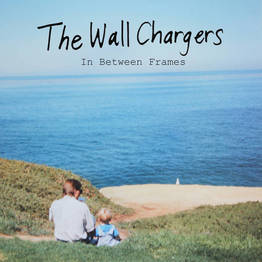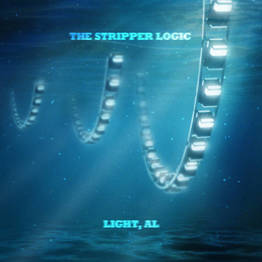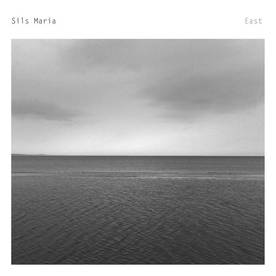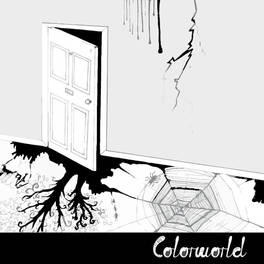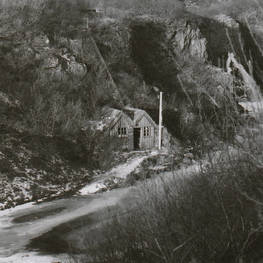|
The self-titled EP Medicine Brother by Medicine Brother is a collection of four songs that highlight the tight grooves as well as the vocal and instrumental abilities of the band. These are the types of songs that burst off the speakers. The guitars are bright and reverb laced and the vocals are delivered with an exuberant energy that is hard to deny.
“Chromic” opens the EP with Explosions In The Sky-like guitars doused in reverb and epicness. The vocals have some Catherine Wheel-ish inflections, and there are some nice harmonies, subtle piano and a great build at the end of the song. “Salt Lake” bounces between two different vocalists between verse/chorus giving some contrast in tone and inflections. There is some nice space in the second verse as well as towards the end letting the words and music resonate further. The feel changes towards the end, which is a little abrupt and could be more subtly executed, but it has some great instrumental moments in it. “Kafka” has a Sea & Cake-esque groove to it as well as in the tonal aspects of the guitar and keyboard. The lyrics are really smart and the interaction between the two vocalists heightens them. Also of note, the bass work is particularly inspired on this track. The EP closes with a live version of “The Milk,” fueled by ‘80s bass (both in synth tone and in octave leaps). Lyrically, the song does not offer much, but there is a nice synth break towards the end with the ostinado building into guitar/drum rock-a-thon. An awkward switch to 12/8 diminishes the energy a bit, but there are still some nice instrumental parts in it. Overall, Medicine Brother has lots of talent oozing out of each note. Some attention to transitions might just help elevate them one more step.
0 Comments
Shane Drake (vocals), Spencer Davis (guitar/vocals), Joe Baldasio (guitar) Justin Howlett (bass) and Jaret Maillet (drums) are GUNR. The band recently released GUNR a self-titled four-song EP that melds hard rock and a bit of southern flair. You can even argue that the music is more metal than hard rock as the cliché demon-like growls and intense double bass drum make themselves known throughout the four songs.
The production and recording quality is radio ready. There is clear separation between the instrumentation even though the songs usually contain a barrage of distortion from the guitar and heavy hitting drums. The band opens up with “Boneslide” which is a heavy rocker that bares resemblance to the ‘90s grunge band Alice In Chains. Once the songs gets going the energy is pretty intense all the way through as different vocal filters and different singers give the song a sense of variation. The lyrics seem to revolve around a bitter breakup. He sings, “Every step I take in the right direction / You're a step ahead and I waste my time / I never thought that I'd loathe you / But you need to go away.” “On Top” is another well-crafted, hard-hitting song that deals with a similar topic. Ultimately it seems to be about someone who is dealing with a lot of pain and processing it in detrimental ways. He sings about feeding the anger by drinking the night away. Lyrics like “Goddamn this life of sorrow / Wish it all away” and “Another step towards the grave / Fuck it all, I'll drink this night away” point towards someone who might be going down a downward spiral. The band continues to impress with “Loaded Gun” which lyrically seems to be a little more optimistic than the previous songs. I thought the highlight was “Smile As My Disguise” which is an anger-fueled intense song that touts about the aggravation within his own head. The double bass drum is pretty sick on this song and was a closer that ended things with a bang. The relatively short EP is cohesive and gives you a very good idea of what a full length would sound like from the band. It plays seamlessly from song to song and if you dig the initial vibe you will enjoy the whole thing.
Become A Fan
UGOR is a project from a Belfast-based musician who recently released Sundown. The album certainly has its own sound and revolves around white noise, guitar and vocals that sound as if they were taken down a couple of octaves.
Utilizing white noise is something that has been done before. In fact if you want hear a prime example of how to use white noise effectively I would listen to “Glide” by Fennesz. Sundown has almost no hooks, takes patience and has some highs and lows. The biggest mishap is when UGOR stretches a riff or idea well beyond their limit. There are some moments where UGOR shines but it feels fairly sporadic. Take for instance the opener “AoD” where I thought balance between the clean acoustic guitar, vocals and white noise worked out very well. The song would have been great if it would have ended around the four-minute mark. To be blunt UGOR plays a variation of the same initial riff and it gets exhausted. At the end of the spectrum are the next two songs “Solstice” and “Outro” which both feel like transitional fillers intended to go into a larger, more expansive piece - that song does come and is titled “The Nomad's Lament - 4V.” The singing isn't as catchy as on “AoD” and veers towards spoken word in which you can’t hear the lyrics. “Run” spills over from being white noise into digital distortion. Perhaps there is a song buried underneath. Even the most hardcore fans of avant-garde music will have a hard time dealing with these harsh noises. The biggest mishap is “Stormy Seas - 4V2” which is more less a basic chord progression over white noise. This song may have worked much better with a crescendo or layers of other instrumentation that slowly comes. Instead your mind loses interest because of the seven-minute runtime, which doesn’t have a notable change. Sundown has a lot of promise and can hopefully be used as a foundation for greater things to come. UGOR has some decent ideas and has a sound but the music is in desperate need of more dynamics and more transitions. I would say UGOR is a case of wait and see.
I didn’t watch this year’s Oscars but I don’t live under a rock either so it was impossible not to hear about them. Besides the obvious controversy of the nominees, there was the big news that Leonardo DiCaprio had finally won the Oscar for best actor. It had taken him years, and many questionably great performances to have finally reached the stage to collect this long coveted prize that often eludes many working in that medium. And in that moment when he stood on stage to address a crowd of millions he could have said anything he damn well pleased. So what subject did he choose to address? Well just in case you happen to live under a rock the answer is climate change, a cause that the actor has been vocally passionate about for many years.
And though it’s nice to have a well-known voice to speak to millions about your cause for a few moments on television one shouldn’t forget the lesser known voices who gather around the world trying make a difference themselves and spread the word about saving our environment. That is precisely what the Seattle by way of upstate New York alt-folk duo Animals of Grace, 12-string guitar player and classically trained vocalist Erika Lundahl and percussionist Doug Indrick attempt to accomplish with their music. Their latest release Songs of Shattering is a concept album in the vein of fellow Seattle musician Jason Webley's Margaret which was inspired by a book of poems and photographs Webley found in a dumpster in San Francisco. For Songs of Shattering Animals of Grace channels the poetry of Edna St. Vincent Millay, using Millay’s poetry for lyrics. On the opening song “Three Songs of Shattering” is a funky-folk take on the spoken word genre that ends with a bit of the old whistle popularized by Andrew Bird. Next “Only Until This Cigarette is Ended” begins with Nick Drake styled guitars and Lundahl’s fierce, confident vocals and then gets a bit trippy as hazy feedback gives way to a barely audible old recording of Millay, which bleeds into and becomes more clear on “Recuerdo” on which Indrick adds in his backing vocals, and in and out Millay reads and it is haunting and stunning at the same time. The mood changes on “The Penitent” which has a slow burn acoustic blues feel to it, and Lundahl, reading the opening lines of the lyrics is laughing to herself as she reads them, and helps to lighten the mood of the songs theme. Next on “Grown Up” there is a mix of the operatic and the space age, and they continue to experiment on the short and sweet “The Unexplorer” the lyrics of which give a sly look into Millay’s sense of humor. In all honesty Songs of Shattering is not an easy record to get into. Like great poetry and literature in general things may seem slightly out of place if one is not used to having to give a little to get a lot. But the time invested is worth it, and soon you will begin to see what Animals of Grace along with their ghostly companion Edna St. Vincent Millay are doing, which is making true art.
The early '80s were an interesting time in underground music. The musical culture had assimilated the energy and possibility of punk rock, a return to the primal fury of early rock n’ roll. Very quickly, however, people grew tired of punk's restrictive anti-chops, longing for the accessibility and musicality of pop. New wave and synthpop quickly grew to replace punk, kicking off a new age of futurist pop, blending the arty experimentalism of the avant-garde with punk's edge and new wave/synthpop's catchiness and polished production.
Sadly, new wave and synthpop quickly steamrolled any edge punk might've brought to the table, and pop music was smooth as synthetic silk, yet again. The Mirrors self-titled debut The Mirrors, originally released in 1987, imagines what might've been had the experimentalism and edginess of punk continued unabated, while still incorporating classic songwriting and top-shelf production. The Mirrors were a SoCal quintet, trading in muscular guitar riffs, romantic reverbed vocals and powerful percussion in a kind of stripped-down, blue-collar new wave pop. If Southern Death Cult, early The Cure, and Bruce Springsteen were to have a safety-pinned stepchild, it might sound like The Mirrors. The Mirrors was recorded at a handful of small LA studios and produced by Mark Christian, an LA session guitarist best known for working with the Village People. There's not a trace of disco to be heard, on The Mirrors, however - just sharp, tight songwriting and pro production. Melodic guitars glisten with that distinctive '80s chorus, a la The Cure or The Teardrop Explodes - a particular Paisley psychedelia. Too often, however, new wave-indebted sounds such as these were thin as skinny ties, favoring a dry production style. The Mirrors, however, pack a powerful punch, particularly with the rhythm section; which, while understated, still kicks like a cotton-swaddled Howitzer. It's the first clue there's more going on beneath the hood, with The Mirrors. Check out album opener "One More Kiss" for a great example of what might've happened had new wave, punk, hard rock and metal were to collaborate instead of war. For the longest time, it was tempting to label all re-issues and reformations as pure, prime nostalgia with music fans longing for simpler times and familiar sounds. There's the other aspect to it, however, with musical tastes catching up, offering up a chance for re-appraisal. With a couple of decades of ardent power pop worship under our belt, now that the war between intellectual, experimentalism and raw energy has been laid to rest, the time is right to hear The Mirrors. It's easy to imagine a popular re-issue label like Sacred Bones or Captured Tracks coming across The Mirrors' self-titled debut The Mirrors in a bin and losing their shit. Thankfully, you get to hear it in glowing, restored fidelity and imagine what might've been. Take note, The Mirrors are not trying to relive former glories. All of the members have been musically active in the interim. If you like the blend, make sure to check out The Big F, Sonic River, and Disappointment, Inc. You won't be disappointed!
There's a sense of brimming energy, restive and restless, just bubbling under the surface of In Between Frames. Not to say there's anything sleepy about the EP's quick, five-song jaunt—just that there seems to be a concerted effort towards restraint. The result is something delicate and vulnerable. Rather than a quick EP as an extended preview of a full-length, here is a coherent, concerted effort—a vignette, of sorts—that finds a versatile band exploring a soft, lush side with intuitively build songs that fit together tightly.
The Wall Chargers hail from a from a Venn diagram-like corner of the South, where Arkansas, Louisiana and Texas abut (it's been coined “Ark-La-Tex”), their sound every bit the amalgamation that their surroundings are. There're strong roots influences as well as the pedal steel twang of classic country—but there's also some rock and rhythm, gospel and sweeping suggestions of baroque. Despite being such a musical mutt, the band manages to maintain the gait of a purebred, making the mixture of influences sound like most logical, intuitive thing. In Between Frames sets the tone with a diverse and poignant opener. “Lighthouse” starts with a sad, sashaying horn that finds hope as it begins to harmonize with another, before a guitar ringing in changes the focus and the drums tumble forward, with reedy-but-full vocals hot on the heels. It's a beautiful way to open an album: it establishes a landscape, paints a horizon and gently invites you in—all in under 30 seconds. The Wall Chargers find distinction in a full sound with a more minimalistic approach—they create open spaces and are less prone towards filling every nook. Vocally there are often similarities with Grizzly Bear, although without the multi-part harmonies that band is known for. The horns and background instrumentation remind me of Father John Misty's fabulous 2015 release, I Love You, Honeybear, but without opting for the full orchestral effect on this album. The tracks are all effective at building, adding layers and filling out quite a bit by the end. So, while the album takes a decidedly roots-y turn at the onset of the second track, by the end it's filled out with horns and harmonies, providing an effective transition to the third track “Counterweight.” That song stands as a steady fulcrum at the center of the album, taking a semi-repetitive romp that allows the band to throttle intensity up and down, adjusting that slow burning simmer before fading out at the end towards the backside of the album. “Friend of Mine” is a straightforward acoustic guitar song in a Southern, Dylan-esque sort of way, while the last song, “Up & Up,” provides an apt bookend to the EP. The closer has a bit more of a tumble forward between the bass and drums, but with the guitar meandering. It's the highest energy the album showcases, still maintaining some restraint, but almost suggesting that what's to come next is sure to have a little bit more rock n’ roll flare to it. The album was recorded in the band's hometown of Shreveport, Louisiana and is the 12th release they've put out as a loose group under one name or another. The production is simple and effective: there's not a lot of studio magic or effects visible on the surface, but surely deft hands were involved to maintain such a natural, full-yet-spacious sound. These songs were pulled from the recording process for a full-length, due out this summer on Day Old Blues Records.
Ambient electronic music is particularly adept at evoking empty cityscapes from the ghostly isolationism of Burial to the brutalist architecture of early Detroit Techno. The hypnotic, repetitive rhythms seem to speak of vast underground engines, hidden infrastructures, while synthesizers sound more like distant air raid sirens or prehistoric birds than musical instruments much of the time.
Light, AL, the exquisite debut LP by The Stripper Logic, imagines what a desolate cityscape might sound like in some distant galaxy, as it's slowly re-absorbed by Day-Glo jungles and inhabited by colossal beasts. Album opener "Dorian Grey" comes on like the sunrise with gentle, ebbing synths wavering like a heat mirage, and sea spray is looped into a hissy rhythm. You'll practically taste the salt spray on your lips. This floating ambiance continues for a short while, with a powerful, piston-like beat coming towards the end, letting you know this is not going to be merely a head nodding, eye-slitted floating ambient record. Analog ambiance meeting strong, stomping beats are pretty much the prototype for The Light Al's, as the album's nine tracks flip between these two polarities. The result is both soothing as well as exciting, thanks predominantly to the beats. The beats deserve an honorable mention here, as The Light AL's are exceptional. The kicks thud like cannon fire without overwhelming the mix, while hi-hats are welded into levitating scrap metal sculptures; Trap Music as High Art. Fans of new wave grime, a la Jlin or Baauer are going to flip for this record, as will fans of Ambient Techno like Loscil, Monolake, or Gas/Wolfgang Voigt. There are a few moments that break the transportive spell, like the otherworldly house music of "A Thousand Years" whose plastic piano chords sound straight out of an Orbital single in the early '90s, sounding much more conventional and harsh on the ears than the rest of the record. These foibles are fleeting and easily overlooked from a new band. The Stripper Logic is a transcontinental collaboration, splitting its time between Atlanta, NYC, Philadelphia and Budapest. Clearly, they're a devoted band of sonic alchemists, going to great lengths to weave their alien worlds. Light, AL is a nigh-on perfect ambient electronica album, being both imaginative and exploratory, as well as gently driving. The next time you need a soundtrack for exploring a city being slowly swallowed by giant leathery vines, throw on Light, AL and get lost.
The cloud phenomenon that sometimes occurs in the tiny Swiss hamlet of Sils Maria is notable due to the fact that one can stand on the mountain peaks that surround it and when the clouds roll in look down on them hiding the valley below beneath a sea of clouds. This quaint and quiet village and meteorological phenomenon is where Stony Brook, Long Island singer songwriter Jeremy Linzee takes his moniker from.
On his debut record East, Linzee paints somber portraits of lives of people who seem to be themselves adrift and alone. On the gentle opener “Neue Galerie” and with its gentle clicks of acoustic guitar and lapping keys, sets the tone for East. The mysterious and haunting “Soldier” seems to have its roots in Andrew Bird’s more lush recitals as does the equally ethereal “Plastic Bag” where Linzee uses the metaphor of a floating plastic bag, floating down the street of someone that used to be close to him perhaps but then remembering floats on. One of the biggest highlights of East is the nearly five minute long “Kick at the Leaves” a hushed and lush song which laps its way gently along as though it were borne up small waves in the middle of a sea. Another highlight or highlights are Linzee’s use of multiple vocal tracks, which gives the songs a foggy resonation. They are important because then the songs on East have much more complexity and keep Linzee from getting lost in the shuffle that many solo musicians kind find themselves in. Two more stand out tracks are the ambient and groovy “Letter” a five plus minute instrumental which features saxophone and strings and its shorter instrumental companion “Ruins.” Here we hear Linzee demonstrating that the singer songwriter can sometimes do away with the singer part and still make music that makes you feel something when you hear it. East is definitely an album for anyone who is currently striking out on their own as a musician. It can teach you things about how to make yourself sound like more than just a person with a guitar. East is also a great record for people who appreciates music that has a soulful richness to it, and that though their subjects may be sad they are also healing. Either way don’t let East pass you by.
Become A Fan
A trio of musicians with different stylistic backgrounds, Colorworld first came together in 2013 and over the next two years perfected their sound and created an EP entitled This Is Where It Ends. Without releasing their first EP, the band continued their songwriting spree and finished their new songs, recording them in a studio and releasing them as Colorworld EP. The band does not box in their style by naming it, instead letting their talent speak for itself without a label or genre.
“Phantom Pilot”, the album’s first track, exhibits the band’s vast array of influences and structural motifs throughout the six minute opener. Belted lyrics, lightning paced percussion, and extended instrumental segments allow this track to isolate the listener’s attention from beginning to end, whether during jazzy chords, relaxed alternative strumming, or hard-hitting rock choruses. A beach-surf rock guitar with vocals begin “Scratch The Sulfur” before crashing cymbals, thumping drums, and quick guitars take the spotlight as the piece evolves into an upbeat rock & roll tune. This song is one of the few on the album that fits nicely into a specific genre, although Colorworld successfully manages to incorporate their own approach and mannerisms into the midst of the torrent of sounds and notes. “Compasshead” continues to propagate the sanguine energy of the record with its loud dynamics and throbbing pulse that echoes the emotive aura of the lyrics permeating through the gravelly, yet melodic singing. The song seems to follow a structured song form, at least until the end, where a new tempo and fresh tone explode onto the soundscape, ending the song with a bang. The next song, “R.O.B.O.”, brings out a slightly less blunt side of the band’s music. This slower, more harmonious ballad contrasts well with the rest of the album, and additionally shows that the band can strongly generate music of many types. The album ends with “Down The Drain”, that contains different bass and drum grooves for each verse, followed by an “out of nowhere” bridge that leads to a brand new ending. This song is essentially the posterchild of the band’s style, and as a whole, this album will certainly show listeners that Colorworld is more than worth following.
There is a softness to the recent release Veins of the Earth by Al Helperin. I was reminded of the aesthetics I feel when listening to The Microphones. Helperin’s vocal delivery never strains and almost feels fragile. That softness is also apparent in the instrumentation. The guitars are plucked gently and atmospheric pads add to the overall hum of Veins of the Earth.
Helperin does a very good job at making the album cohesive. There is certainly a unified feel to all the songs. He starts off with “Headlights” which is a lush, expanding song. The vocals sound almost monotone but I say that in a good way. It works with the music. The lyrics actually read like the very music that is being played. He sings, “Soft light swells around me / Like smog on a distant city / A city full of people left behind.” The introduction of a prominent acoustic guitar on “Deconstruct” is a well-executed transition from the opener. His vocals are full morose and the lyrics seem to revolve around his own death. He sings, “You killed me near a beach last night / Sailed me out, no land in sight / Threw me off, it all went black / What form I'll take when I come back If I'm coming back?” “Pale Orange Skies” is another solid effort and the band Low came to mind. The vocal melody really holds down the track from feeling like it's going on too long. Even the drums of “Tracks” have a soft quality to them. The instrumentation is exceptional on this track and sounds similar to the quieter moments of Mogwai. “I Will Not Become a Ghost” has a memorable vocal melody along with a section that breaks down into white noise. Great stuff. On the closer “Veins of the Earth” Helperin ponders big questions. He sings, “I don't know if everything matters / Each moment cascading together / And in a way they reach significance / Do they think of the end is it simply an endings of moment / That swell and fade any existence.” Veins of the Earth isn't without some flaws but there is a lot to enjoy on the album. Helperin doesn’t overdo the melancholy and balances the mood and songwriting with expertise. Recommended. |
Critique/insightWe are dedicated to informing the public about the different types of independent music that is available for your listening pleasure as well as giving the artist a professional critique from a seasoned music geek. We critique a wide variety of niche genres like experimental, IDM, electronic, ambient, shoegaze and much more.
Are you one of our faithful visitors who enjoys our website? Like us on Facebook
Archives
April 2024
|

